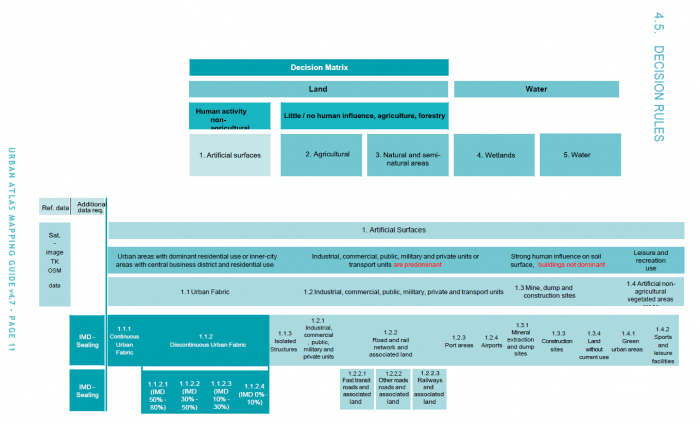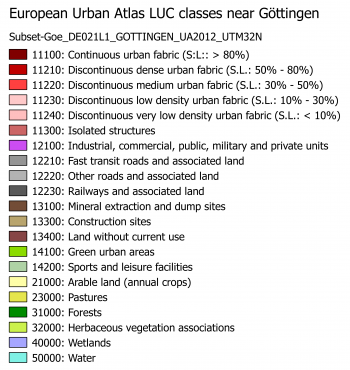Training data selection (SCP)
(→Defining land use/cover classes) |
|||
| (One intermediate revision by one user not shown) | |||
| Line 71: | Line 71: | ||
| 62 | | 62 | ||
| Cloud shadow | | Cloud shadow | ||
| − | | | + | | 100-50-0 |
|- | |- | ||
| 6 | | 6 | ||
| Line 79: | Line 79: | ||
| 0-0-0 | | 0-0-0 | ||
|} | |} | ||
| − | |||
| − | |||
| − | |||
Latest revision as of 09:50, 24 November 2020
[edit] Defining land use/cover classes
Before starting to map land cover classes using Sentinel-2 satellite images we need clear definitions and a classification scheme. An example for a hierarchical land use and land cover (LUC) classification scheme is the European Urban Atlas. The scheme defines 5 meta classes where the class 1. Artificial surfaces has many sub classes as shown in figure A.
The specification of other meta classes is not as detailed. If we are more interested in forest and open area classes we need to adapt and modify this scheme. On the lowest level not all classes defined in the European Urban Atlas do also appear in the surroundings of Göttingen (figure B). In addition we need to consider the phenolgical development of vegetation at specific acquisiton dates and to specify more classes which can possibly be identified in multispectral feature space of the satellite image. An example of an adapted simplified scheme is shown in the table below.
| MC ID | MC info | C ID | C info | RGB code |
|---|---|---|---|---|
| 1 | Artificial surfaces | 11 | Built-up | 230-0-77 |
| 2 | Agricultural | 22 | Arable land | 255-255-168 |
| 2 | Agricultural | 23 | Bare soil | 253-191-168 |
| 2 | Agricultural | 24 | Pasture | 230-230-77 |
| 3 | Natural and semi-natural areas | 31 | Broad leaved tree cover | 128-255-0 |
| 3 | Natural and semi-natural areas | 32 | Coniferous tree cover | 0-166-0 |
| 5 | Water | 51 | Water | 128-242-230 |
| 6 | Miscellaneous | 61 | Cloud | 255-255-255 |
| 6 | Miscellaneous | 62 | Cloud shadow | 100-50-0 |
| 6 | Miscellaneous | 63 | Unclassified | 0-0-0 |

